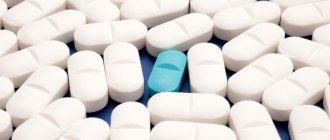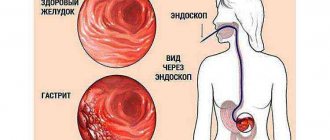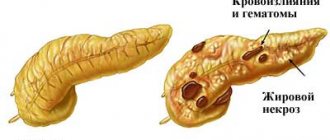One of the most common gastrointestinal diseases is gastritis. Against the background of the development of inflammatory and destructive processes in the stomach, the mucous surface is damaged, which is manifested by such symptoms as: heaviness and pain in the stomach, nausea, vomiting, flatulence, bloating, and stool disturbances.
Vomiting is a reflex eruption of stomach contents through the mouth, and in rare cases, through the nose.
If vomiting continues for more than 12 hours, you should consult a doctor to find out its causes and establish a diagnosis, start with a therapist. Prolonged vomiting leads to dehydration. In addition, hypokalemia, alkalosis develops, and metabolic processes are disrupted.
In case of acute pain, call an ambulance immediately.
With profuse vomiting, a rupture of the mucous membrane of the esophagus, a transmural rupture of the esophagus, a rupture of the mucous membrane of the esophageal-gastric junction, accompanied by heavy bleeding, is possible.
Eliminating nausea with folk remedies
If a person experiences nausea due to gastritis, how to get rid of the ailment using traditional methods?
Ginger
Ginger improves the functioning of the digestive system. You can brew healthy tea that helps with nausea and gastritis. To do this, add 10 ml of grated ginger to 200 ml of water. The product must be infused for at least ten minutes. The resulting drink must be filtered. You can add a small amount of honey to it. During the day, it is recommended to drink no more than 400 ml of infusion prepared with ginger.
Dill seed decoction
A decoction of dill seeds has also proven itself to be excellent. It is prepared according to the following recipe:
- 5 ml of dill seeds are poured into 200 ml of boiling water;
- The product should be simmered over low heat for 10 minutes;
- The drink is then cooled and filtered.
It is recommended to drink 100 ml of the product twice a day. The duration of the course of treatment is two weeks.
Nausea in various forms of inflammation
In acute gastritis, nausea and vomiting are usually associated with the consumption of spoiled foods or toxic substances. The stomach strives to quickly remove them from the body, so vomiting is typical for the acute stage of the disease.
It can be done once or twice and brings relief to the patient. The exception is severe infections of the digestive system, when bacteria release potent toxins that can directly irritate the vomiting center. Then the central mechanism turns on, and vomiting becomes repeated.
In hyperacid and erosive gastritis, nausea is provoked by excess hydrochloric acid. Under its influence, the receptors become too excited and send a signal to the brain that there is an aggressive substance in the stomach.

At the same time, the presence of erosions makes the mucous membrane more sensitive; it reacts even to a slight decrease in pH.
This is why nausea after eating with erosive gastritis develops much more often than with other forms.
Nausea against the background of atrophic and hypoacid inflammation is associated with stagnation of food in the stomach and excessive stretching of its walls.
Pathogenic microbes also make their contribution: in conditions of insufficient amounts of digestive enzymes and hydrochloric acid, they actively multiply, and their metabolic products trigger the gag reflex.
These forms of the disease are characterized by almost constant nausea, discomfort and distension in the epigastric region, which intensifies after eating. Vomiting occurs infrequently.
Omez for nausea and gastritis
The drug eliminates nausea, heartburn and pain in the abdominal area.
The drug promotes healing of the affected surface of the stomach.
"Omez" has bactericidal properties: it neutralizes the activity of the bacterium Helicobacter pylori, which provokes the development of gastritis and peptic ulcers.
For gastritis, it is recommended to take one capsule of the medicine in the morning on an empty stomach. If necessary, the dosage of the drug is doubled. The duration of the treatment course ranges from two to three weeks. In severe cases of the disease, treatment can last two months.
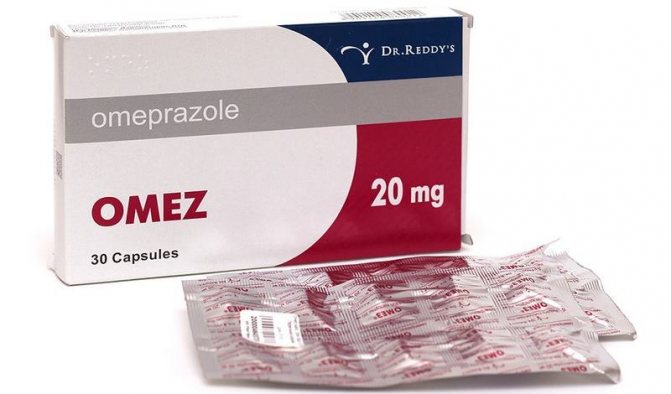
When using the drug, the following side effects may occur:
- Headache;
- Drowsiness;
- Weakness;
- Pain in the joints;
- Skin itching;
- Allergic rash.
If the recommended dosage of the drug is exceeded, the following undesirable effects may occur:
- Feeling of dry mouth;
- Deterioration of vision;
- Increased heart rate;
- Confusion;
- Headache.
The drug is not recommended for use during pregnancy and breastfeeding. The use of the drug should be discontinued in case of hypersensitivity to its components, pituitary adenoma, or intestinal obstruction.
Forms of gastritis, their causes and symptoms
| Form of gastritis | Symptoms | Causes |
| Acute form | 1. The disease and its symptoms occur suddenly; 2. Nausea and vomiting can occur at any time of the day, regardless of food intake; 3. High temperature; 4. Weakness, fatigue. | 1. Eating low-quality foods; 2. Overdose or improper use of medications; |
| Chronic form | 1. Nausea occurs in most cases in the morning after eating; 2. Aching pain in the abdominal area can last for weeks; 3. There is paroxysmal pain in the upper part of the peritoneum; 4. Worried about heartburn and belching. | 1. Failure to follow proper nutrition rules for a long time; 2. Frequent stress and nervous disorders. |
| Gastritis with high acidity | 1. Morning sickness with an unpleasant taste in the mouth; 2. Frequent belching with a sour taste; 3. Burning pain in the stomach area. | 1. The presence of the bacterium Helicobacter pylori; 2. Abuse of hot, spicy, fried foods; 3. Ingestion of toxic chemicals into the stomach; 4. Hereditary predisposition; 5. Systematic intake of non-steroidal anti-inflammatory drugs; 6. May be a secondary symptom of other endocrinological diseases, as well as a consequence of a violation of autoimmune processes. |
| Gastritis with low acidity | 1. Nausea may not go away for a long time. It appears regardless of food intake; 2. The stomach seems to be bursting from the inside, even with a small amount of food; 3. There is frequent belching with a rotten taste. | |
| Erosive gastritis | 1. Nausea followed by vomiting with blood; 2. In severe and advanced cases, feces with blood are observed, which indicates the presence of internal bleeding. | |
| Gastritis in pregnant women | 1. Nausea even after eating small amounts of food; 2. Heartburn even when eating foods that are easy to digest. | 1. As the uterus grows, this organ puts pressure on the walls of the stomach, thereby reducing its volume, which causes nausea and pain; 2. Due to unstable hormonal levels during pregnancy, disruptions in the functioning of other organs of a woman, including the stomach, are possible. |
| Gastritis in a child | 1. Dry mouth; 2. Abdominal pain; 3. Nausea, accompanied by belching and vomiting; 4. Possible excessive salivation; 5. Rash on the skin. | 1. Fatty and rough foods in the child’s diet; 2. Taking certain medications; 3. Ingestion of various types of bacteria (Escherichia coli, salmonella, etc.) along with low-quality food; 4. As a consequence of other types of infectious diseases (measles, diphtheria, etc.). |
As can be seen from this table, the symptoms of different types of gastritis are similar. This suggests that at the first manifestations of the disease, it is necessary to immediately contact a specialist who will make the correct diagnosis and prescribe appropriate treatment. Self-medication can worsen the disease.
Application of Cerucal for gastritis
Many patients wonder: how to relieve severe nausea and vomiting with gastritis? If these symptoms appear, you can use the drug "Cerucal". The main active ingredient of the drug is metoclopramide hydrochloride. The drug quickly eliminates vomiting and normalizes intestinal function. “Cerukal” accelerates the process of bile secretion, so the drug is also used in the treatment of biliary dyskinesia.
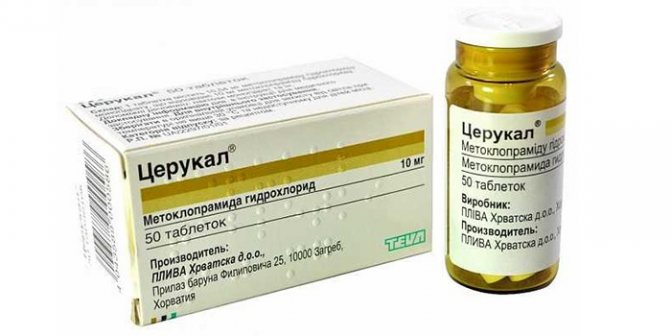
The drug is available both in the form of tablets and as a solution for injection. When using Cerucal in tablets, the maximum concentration of the active substance in the blood is achieved 60 minutes after taking the medicine.
It is recommended to take the drug half an hour before meals. Take the medicine with a sufficient amount of liquid. Adults should take one Cerucal tablet three times a day.
When using the drug, the following undesirable effects may occur:
- Menstrual irregularities in women;
- Dizziness;
- Dry mouth;
- Diarrhea;
- Skin rash.
The drug should not be taken in early pregnancy and during breastfeeding. It should not be taken in the presence of epilepsy, individual sensitivity to the components of the drug, epilepsy, intestinal obstruction, or pyloric stenosis.
How to get rid of nausea
There are several ways to get rid of this unpleasant manifestation of inflammation of the gastric mucosa - by taking medications or using traditional medicine. However, it must be remembered that in no case should you fight such a disorder on your own, as this can only aggravate the course of the disease.
Treatment with medications should be started only after the doctor determines the acidity of gastric juice. Those medicinal substances that can be used with high levels of hydrochloric acid may be prohibited in patients with low secretion of gastric contents. Drug therapy consists of taking:
- antibiotics – aimed at eliminating the pathological microorganism;
- antispasmodics - to relieve pain;
- antiemetics;
- gastroprotectors - to protect the mucous membrane from irritants;
- steroid hormones.
Thus, it is important not only to eliminate nausea and vomiting due to inflammation of the stomach lining, but also to get rid of the rest of the symptoms that develop against the background of these signs.
In addition, such a disorder can be treated using folk remedies. Despite the fact that eliminating the disease using this technique takes quite a long time, non-traditional recipes cope well with such an unpleasant symptom as nausea. Such therapy involves the use of:
- peppermint;
- chamomile and linden;
- yarrow;
- freshly squeezed potato or celery juice;
- decoction based on lemon slices;
- grated ginger;
- dried cloves.
However, it is worth taking into account the fact that nausea and vomiting can be eliminated using traditional medicine only if symptoms occur once. In addition, such treatment should be carried out under the full supervision of a specialist.
How and with what to relieve stomach pain with gastritis
It is difficult to find a person who has not had a stomach ache at least once in his life. This problem can be encountered at any age, regardless of gender, lifestyle, diet and physical activity.
And although the causes of stomach pain are quite varied, the main and most common is gastritis.
Stomach pain with gastritis can be constant or occur periodically, depending on the form of the disease - acute or chronic.
In any case, to make a correct diagnosis, you need to consult a doctor who will prescribe adequate treatment and select the necessary medications, because gastritis comes in different types and, therefore, requires a different approach to treatment.
But it happens that it is impossible to seek medical help at the moment, and unbearable pain in the stomach causes severe suffering. In this case, it must be stopped before going to the hospital.
This article will tell you what to do and how to relieve stomach pain with gastritis.
Gastritis and how to relieve pain
For starters, it’s a good idea to find out what causes gastritis and what the main types of this disease are. Depending on the cause of the disease, gastritis can be:
- Bacterial. Responsibility for it lies with a bacterium called Helicobacter pylori. The microorganism lives in the stomach of most people on the planet, but under certain conditions it begins to multiply rapidly and the toxic waste of its activity damages the mucous membrane, causing symptoms of gastritis.
- Nervous (stress) gastritis. Its exacerbations often occur on the eve of important meetings, events, during exams, under stress or depression.
- Catarrhal is the most common type of gastritis. Occurs with constant or periodic errors in nutrition. Fatty, fried, spicy foods can provoke attacks; excess spices, sauces, marinades; smoked foods, street fast food, carbonated drinks, as well as poor quality food and certain medications.
- In addition to the described types, which are considered uncomplicated, there are other, more severe forms of gastritis - fibrinous (requires emergency care, as death is possible), atrophic and hypertrophic (risk of developing a malignant tumor), phlegmous (treatable with antibiotics). Such complex cases are treated exclusively by specialists and there can be no talk of relieving stomach pain at home.
Despite the different types and causes of stomach disease, the symptoms characteristic of uncomplicated forms of gastritis appear almost identically in all cases:
- sharp pain in the stomach area
- heaviness in the upper abdomen
- poor appetite
- bloating
- nausea and vomiting
- bad taste in mouth
- heartburn, belching
How to quickly relieve gastritis pain
To normalize the condition during a painful attack, you can resort to over-the-counter medications or folk remedies.
Depending on the manifestations of gastritis symptoms and the nature of the pain syndrome, appropriate medications should be used.
For heartburn
Antacids - drugs that neutralize acid in the stomach and relieve the feeling of heaviness and burning in the esophagus - will help cope with this rather unpleasant phenomenon. Their choice is quite varied and the pharmacy will sell them without a doctor’s prescription.
- Almagel - take 1-3 teaspoons, depending on the severity of the condition, 3-4 times a day
- Maalox – 1 package (15 ml) - up to 6 r/day.
- Phosphalugel – 1-2 packages 2-3 r/day
- Gastal – 1-2 tablets (no more than 8 during the day)
- Rennie – 1 tablet up to 16 times a day
- Vikair – 1-2 tablets 3 times a day.
- Vikalin - 1-2 crushed tablets with half a glass of warm water 3 times a day.
All antacids should be taken an hour to an hour and a half after meals and three hours before the next meal.
If the heartburn is very severe and cannot be tolerated, regular baking soda will help; you can use it, but often you should not do this, since soda will cause the condition to worsen in the future.
Let this be an emergency remedy in case of emergency when the necessary medicine is not at hand.
In case of severe heartburn that does not go away after using an antacid, it is better to take additional Rennie, this drug will work like soda and will quickly relieve heartburn without causing harm to the stomach lining.
For acute, cramping, cutting pain in the stomach, use antispasmodics
The most common of them is No-shpa or Drotaverine (an analogue that costs less).
The product works well both when used intramuscularly and in tablet form. The dose of the drug is for adults 1-2 tablets 3 times, a maximum of 6 tablets per day.
In addition to No-shpa, other antispasmodics are used:
- Spasmalgon
- Papaverine
- Tempalgin
- Maxigan
These medications help relax the muscles of the stomach, they will relieve spasms and relieve pain.
To relieve stomach pain due to gastritis, analgesics are also often used - Analgin, Acelizin, Ibuprofen.
This is a more powerful analgesic and may relieve pain faster than an antispasmodic, but such drugs have one significant drawback: analgesics damage the gastric mucosa, and with gastritis it is already quite irritated.
Therefore, in order not to aggravate the condition, pain relief using such methods should be done extremely rarely and in exceptional cases.
If the situation is critical, doctors use narcotic analgesics such as Morphine or Promedol to relieve a painful attack, but their treatment must be supervised by a doctor and cannot be purchased without a prescription.
Therefore, there can be no question of using narcotic analgesics to relieve stomach pain at home.
Regular pain
If gastritis pain appears regularly and is aching and dull, medications containing enzymes to normalize the digestive process in the stomach will be effective:
- Festal
- Enzistal
- Mezim, Mezim - forte
- Creon
- Pancreatin
Such medications are usually taken during meals or immediately after them according to the instructions; a prescription is not required to purchase.
Enzyme products are intended for longer-term use; their one-time use will not solve the problem.
The course of treatment with such medications can last several days, or can last for weeks or even months. Long-term treatment should not take place without medical supervision.
Vomiting with gastritis - a dangerous symptom or a defensive reaction?
Traditionally, we perceive vomiting as a dangerous and unpleasant symptom, trying with all our might to get rid of it. However, this opinion is often wrong. We developed the gag reflex in the process of evolution to protect the body from foreign substances.
Therefore, if vomiting began after consuming expired foods, toxic liquids, or large amounts of alcohol, then there is no need to stop it. It will help the body get rid of toxic substances even before most of them are absorbed and enter the bloodstream.
Important! The exception is poisoning with caustic liquids: solutions of strong acids and alkalis. If they travel back down the esophagus, they will cause a burn and worsen the damage. In such a situation, you need to seek medical help as quickly as possible: the patient will undergo gastric lavage through a tube.
However, in a number of situations it is still worth fighting vomiting. In particular, repeated repeated vomiting leads to dehydration, loss of electrolytes and cardiac dysfunction. It is especially dangerous when this condition develops in a child.
The child's body reacts faster to dehydration. In such cases, in parallel with antiemetics, therapy is prescribed to replenish the loss of fluid and salts: Regidron, Orasan, Gastrolit.
How to cure?
In case of constantly occurring unpleasant symptoms of heartburn, especially after eating, you need to take action. However, self-medication is strictly prohibited, as it can aggravate the patient’s condition and cause complications.
When treating gastritis and heartburn, it is important to follow recommendations for proper nutrition: do not pass or eat foods that irritate the digestive tract, and prepare food correctly.
Principles of dietary nutrition for gastritis:
- eat in small portions, chewing food slowly. Long breaks between meals, more than five hours, are unacceptable. Food should not be too hot and not too cold;
- last meal no later than 2–3 hours before bedtime;
- do not forget to drink plain clean water throughout the day (at least two liters per day).
After eating, it is advisable to rest without engaging in physical labor. You cannot take a horizontal position of the body, as this will cause heartburn.
If a person needs to take medications, the side effect of which is an increase in stomach acidity, these medications must be washed down with milk or taken with meals.
List of foods preferred for those suffering from chronic gastritis:
- low-fat dairy products;
- lean meat (veal, turkey, rabbit);
- cereals and whole grain bread;
- vegetables, except peppers, tomatoes;
- fruits;
- weak tea, still mineral water.
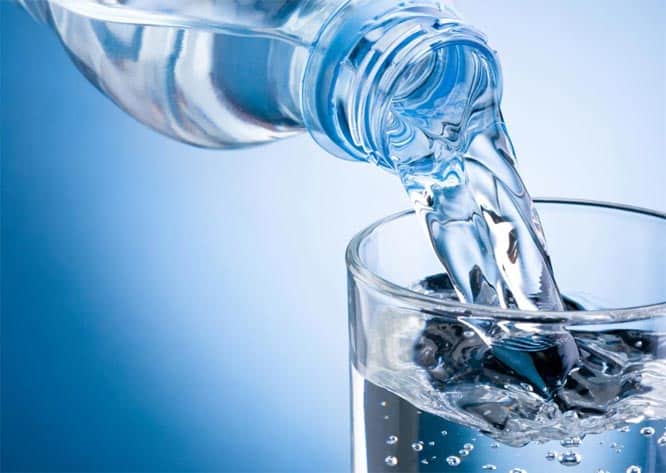
Foods excluded from the diet for heartburn and gastritis:
- alcohol;
- coffee, strong tea;
- sweets;
- spicy, fatty foods;
- tomatoes, citrus fruits, garlic, pepper;
- concentrated juice.
Method of preparing dishes on a diet:
- steaming;
- baking;
- stewing.
Folk remedies
Attention! Regular heartburn requires treatment prescribed by a doctor.
Below are ways to relieve an attack of heartburn due to gastritis.
- A popular remedy is baking soda. Indeed, soda is an alkali and neutralizes hydrochloric acid in the stomach. But you need to be careful with this trivial remedy: private use causes nausea and headaches. In addition, when soda enters the stomach, the resulting chemical reaction releases carbon dioxide, which further irritates the mucous membranes.
- To eliminate heartburn and restore the acid-base balance, decoctions of medicinal herbs, such as chamomile, will help. For the decoction, take two to three tablespoons of dried chamomile flowers and a quarter liter of boiling water. The broth is infused for about twenty minutes and filtered. It is better to buy raw materials for herbal infusions ready-made, at a pharmacy, or collect them in environmentally friendly areas.
- A decoction of the following herbs copes well with impaired secretion: anise, fennel, dill. Take a tablespoon of each herb, pour boiling water, leave and strain. Drink one spoon if discomfort occurs.
- You can also take a decoction of flax seeds. Take 100 grams of boiling water for one teaspoon of seeds. When used, dilute with water to a volume of 200 g. The decoction should be drunk on an empty stomach for two weeks.
- Potatoes are also a remedy for heartburn and accompanying gastritis. Raw potatoes are grated and the juice is separated. Take one tablespoon of juice before meals.
- Oatmeal is a real “friend” for the stomach. The cereal must be crushed and poured with boiling water. The decoction is filtered and consumed half an hour before bedtime.
- A decoction of angelica seeds, roots and leaves has proven itself in the fight against heartburn. The ingredients are ground into powder, poured with boiling water and left for 20 minutes. Take angelica decoction up to three times a day.
- Almonds help neutralize acidity in the stomach. Chew the nut scalded with boiling water quite slowly.
- For gastritis with low acidity, a decoction of plantain leaves is used.
- An excellent effective way to eliminate pyrosis is the use of alkaline mineral water containing bicarbonates. The water should be warm, not carbonated or settled. Treatment begins with 50 ml of water before meals and if discomfort occurs. After a week, the single volume is 200 ml. You need to drink mineral water at least three times a day for a month.
Traditional medicine does not consider herbal decoction and the other remedies listed above as a cure for gastritis. These techniques only eliminate the symptoms of the disease, but not the cause. Before starting folk recipes for heartburn, it is first better to visit a gastroenterologist to assess the acidity of the stomach and the degree of damage to the mucous membrane.
A blood test, abdominal ultrasound and endoscopic examination will allow you to prescribe the correct treatment.
Medicines for heartburn
Heartburn is treated comprehensively, eliminating the cause of the disease. The following drugs are used:
- Antacids.
- Painkillers for severe burning pain in the stomach. Prescribe either antispasmodics or anticholinergic blockers (“No-Shpa”, “Drotaverin”, “Gastrotsepin”).
- Enveloping agents (“Smecta”);
- Restorative drugs for the treatment of damaged gastric mucosa (“Solcoseryl”, “Gastrofarm”, “Caleflon”)
- Enzymes for improving digestion, since in a sick stomach they are not enough to break down food “Festal”, “Mezim”, “Panzinorm”, “Pancreatin”, “Digestal”.
- If gastritis is accompanied by constipation, laxatives (Duphallac, Gutalax) are used.
- Antibiotics when establishing the fact of infection with Helicobacter (Amoxicillin, Clarithromycin). To restore the microflora against the background of antibiotic therapy, for example, Linex and Hilak Forte are prescribed.
- Bloating and flatulence are eliminated by drugs with the active substance "Simethicone", dill water helps.
- If the patient suffers from stress or the nervous system is unstable, sedatives (Persen, Novopassit) may be prescribed.
All drugs aimed at eliminating the symptoms of heartburn are divided into antacids (Rennie, Almagel, Phosphalugel, Maalox) and alginates (Gaviscon, Laminal).
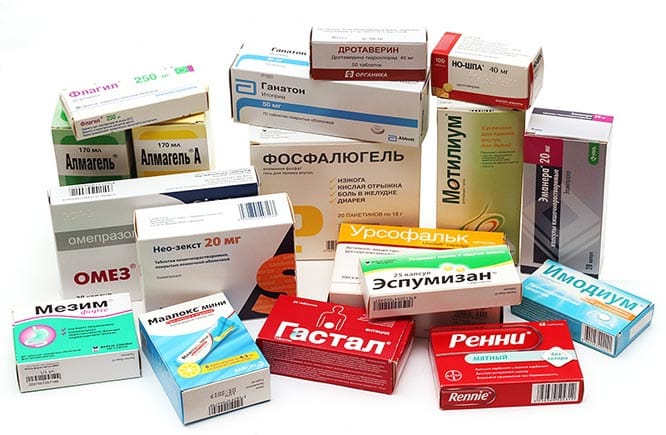
The choice of treatment method remains with the attending physician. It is he who prescribes a specific medicine and dosage.
Antacids neutralize the effects of acid due to the content of magnesium and aluminum. Antacids only work to relieve symptoms and not to prevent pyrosis. These funds have some disadvantages:
- The use of these drugs often leads to constipation and indigestion.
- The duration of action is short, several hours.
- There are no guarantees that heartburn will not recur;
- There are contraindications, including pregnancy and childhood.
- Long-term, uncontrolled use of these medications disrupts metabolism.
There is an additional group of medications for heartburn - antisecretory drugs (Omeprazole, Ranitidine). Affecting the secretion of acid by cells. Thus, taking medications reduces the amount of acid in the stomach. These medications should be taken strictly as prescribed by the gastroenterologist.

Advantages of this group of drugs:
- long action interval (up to eight hours);
- adverse symptoms appear very rarely;
- prevent new manifestations of heartburn;
- There is a suspension for children.
The disadvantages include:
- should not be taken during pregnancy and lactation;
- affect the action of other drugs.
Before you buy any medicine for heartburn, you should visit your doctor to determine the cause of the symptom and prescribe treatment.
Many drugs have contraindications, for example, they are prohibited for use by pregnant women.
You should not take medicine for heartburn for more than two weeks, this is explained by the presence of components that affect water-salt metabolism in the body.
Is it possible to maintain a healthy stomach?
What to do to prevent the development of gastritis? Doctors recommend radical lifestyle changes, which means:
- quitting smoking, drinking alcohol and drinking coffee in large quantities;
- spend more time in the fresh air;
- avoid stressful situations;
- sleep at least 8 hours;
- eat a balanced diet, sometimes go on a healthy diet;
- if the disease is detected but cured in time, you should follow the doctor’s prescription;
- use folk remedies.
Nausea is a classic symptom of gastritis. To get rid of it and the urge to vomit, it is necessary to select an effective drug and effective treatment. Only an experienced gastroenterologist can do this, taking into account the results of a thorough examination and certain tests. For different types of gastritis, different medications are prescribed: for gastritis with a high level of acidity, some drugs, for gastritis with low acidity, others.
The disease is easier to prevent than to treat. A person needs to adjust their lifestyle, eat right, minimize stress, and pay more attention to their own health.
source
Causes of morning nausea with gastritis
Symptoms caused by irritation of the mucous membrane.
Nausea in the morning is most often due to excessive secretion of hydrochloric acid at night, for which the vagus nerve, active in the early morning hours, is responsible. This process is designed to rid the stomach of excess acidity. Morning sickness is common and rarely leads to vomiting. To eliminate this symptom, it is important to normalize your diet and be sure to eat liquid and light food in the morning. This will help neutralize hydrochloric acid and get rid of discomfort. When vomiting with blood occurs, this is a serious symptom and indicates the development of erosive gastritis or a stomach ulcer. In this case, the patient may not feel sick, but such a symptom poses a threat to life.
